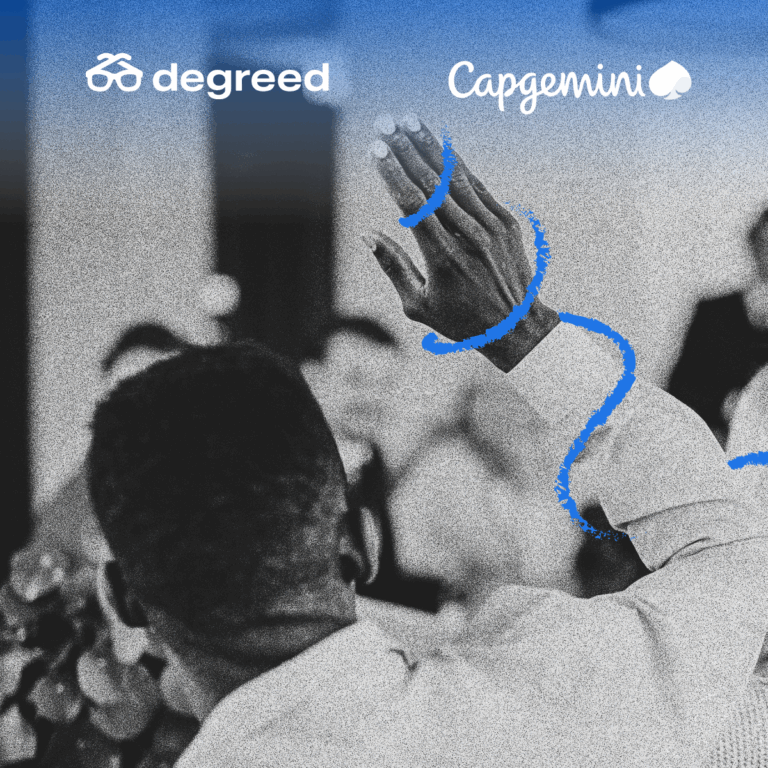
Accelerate Skill Development with Clear Role Expectations
Skill development is mission-critical for today’s enterprises to keep up with the rapid pace of change. But, unclear role expectations are slowing down skill development and leaving employees with questions. For example, What skills do I need to be successful at my role? How do I know if I’m meeting expectations? Where do I need to improve and how should I go about it?
To answer these questions and streamline skill development, L&D and HR leaders must focus on three things:
- Defining expectations clearly for every role
- Communicating those expectations
- Connecting employees with the right information to fill gaps
With new Degreed functionality, you’re equipped to accomplish this, guiding employees to develop the skills needed to be successful in their roles.
How Employees Can Leverage Role Expectations for Better Skill Development
Let’s use Cynthia, a fictitious Software Engineer, as an example. Cynthia just started at Acme, Inc. She held a similar engineering role at her previous company, but she’s curious how expectations differ at Acme.
When Cynthia logs into Degreed, her profile automatically includes the skills that Acme prioritized for her role, along with the target proficiency level for each skill. There’s also a description for each skill and proficiency level, so she can understand the behaviors she should exhibit to reach the target level. She can then use this information, along with a Maestro Skill Review Coach, to identify and set her current proficiency level in her profile.
Once she establishes this baseline, Cynthia can focus her development on filling any gaps. Degreed makes this process straightforward by creating a dynamic skill plans for Cynthia which is automatically populated with content targeting skill gaps for her priority skills. The plan is unique to her current proficiency levels and displays content that will help her progress to the next skill level.
And when she searches for additional resources, she won’t lose any more time sifting through content that is too basic or too advanced. Instead, she will quickly find content that matches her specific proficiency level and where she is in her development journey.
As a result of this process, Cynthia now knows what skills are expected of her, where she needs to improve, and what resources will help her grow the skills that matter most. This certainty and access to right-sized development resources will accelerate her skill development and increase engagement.
How Admins Can Automate at Scale
Personalized learning experiences used to be an exclusively manual process that was too time-consuming to scale. Now, AI handles the manual work so L&D and HR leaders can focus on more strategic work, like defining which, role-based skills are required to align to business objectives
In Degreed Learning, the admins can upload a list of organizational roles, which skills are associated with those roles, and what target proficiency levels are for each. They can also set the priority skills they want to appear on employees’ profiles to target skill development.
In Degreed Skills+, admins harness AI to amplify the impact of the work they have done in associating skills to roles. For example, AI generates proficiency level descriptions for each skill, providing precision on what proficiency means at each level. This information guides employees when reviewing skills, so they can select the right proficiency level according to the organization’s definition.
Admins are also empowered to use AI to automatically tag content in their catalog with proficiency levels. Admins can review and approve these skill proficiency tags as well. This helps match employees to the right content for their skill level.
How the Role-to-Skill Workflow and Tagging Creates Business Value
| Business Leaders | HR and L&D | Employees |
| Efficiently build the skills you need to win in the marketAccelerate workforce agility with highly targeted developmentMaximize ROI by eliminating wasted learning time and resources | Tag and organize a massive volume of learning content in a fraction of the timeFocus on strategy and program designAutomatically personalize learner experience for greater effectiveness at scale | Understand expectations to be successful in your roleFocus development where it matters and at the level that you need itFind the right content to improve performance to make the most of your learning time |
Administrative efficiencies and personalized experiences translate directly into powerful, scalable applications that drive business value. Core use cases that deliver immediate impact include:
- Strategic asset management: Identify gaps and eliminate redundant or outdated resources.
- Onboarding: Automatically serve new hires content tailored to their specific proficiency level in required skills, accelerating their time to readiness.
- Search and Discovery: Deliver search results personalized to each employee’s needs and skill level.
- Career Pathing and Internal Mobility: Clearly map out the skills needed to move up in seniority or from one department to another, creating a win for employees and organizations.
Implement AI for Workforce Development
There are a lot of promises that AI will improve the learning experience and reduce admin workload. With Degreed Skills+, AI can do both.
With our role-to-skill workflow, dynamic skill plans, and automatic proficiency tagging for content, organizations can now deliver highly personalized, meaningful development opportunities at scale—and without added work. Clearer role expectations and tracking mean businesses can speed up skill development to better match the pace of change.
*The functionality discussed in this blog is scheduled to be generally available in April 2026.
Let’s keep in touch  .
.
Sign me up for the monthly newsletter with exclusive insights, upcoming events, and updates on Degreed solutions.



